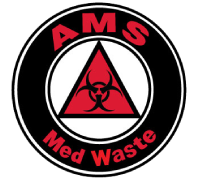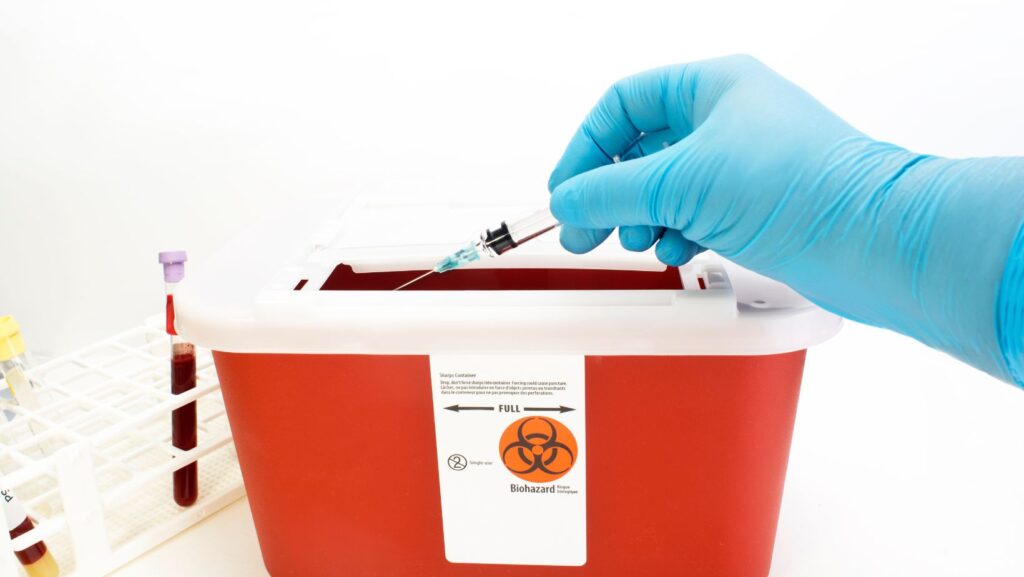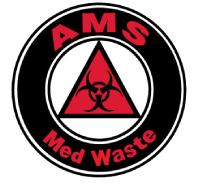Medical waste management is a critical aspect of healthcare facilities, as it directly impacts the safety and well-being of patients, staff, and the environment. For example, dangerous pathogens can spread without proper handling and disposal of medical waste, leading to infections and other health hazards. This blog post will provide an essential guide to medical waste management, highlighting best practices and compliance requirements to ensure the safe and efficient disposal of medical waste.
Understanding Medical Waste
Before diving into best practices, it’s crucial to understand what constitutes medical waste. Generally, medical waste refers to any waste generated during human or animal diagnosis, treatment, or immunization. It includes sharps (needles, syringes, scalpels), contaminated gloves, gauze, bandages, and more.
Types of Medical Waste
General waste: Non-hazardous waste that poses no significant risk to humans or the environment.
Infectious waste: This is waste contaminated with pathogens, such as blood, body fluids, and laboratory specimens.
Sharps waste: These are needles, syringes, scalpels, and other sharp objects that can puncture or cut the skin.
Pathological waste: Examples are human tissues, organs, and body parts removed during surgery or autopsy.
Pharmaceutical waste: Expired, unused, or contaminated medications and vaccines.
Chemical waste: This can be disinfectants, solvents, and other chemicals used in healthcare facilities.
Radioactive waste: Radioactive waste contains radioactive materials, such as those used in cancer treatments or diagnostic imaging.
Best Practices for Medical Waste Management
Segregation and Classification
Proper segregation and classification of medical waste are vital to ensure safety and regulation compliance. Healthcare facilities should have designated areas for different categories of waste, with clearly labeled bins and containers. In addition, staff should be trained on the appropriate disposal methods for each type of waste to prevent cross-contamination and reduce the risk of infection.
Safe Handling and Storage
Once the medical waste is segregated, it must be handled and stored safely until it is ready for disposal. Healthcare facilities should have designated storage areas that are secure and inaccessible to unauthorized personnel. Waste containers should be sturdy, leak-proof, and puncture-resistant, especially for sharps waste. Additionally, containers should be sealed and labeled according to local regulations to prevent accidental exposure or tampering.
Transportation and Disposal
Healthcare facilities should work with licensed and reputable medical waste disposal companies regarding transportation and disposal. These companies specialize in safely handling, transporting, and disposing of various types of medical waste, ensuring compliance with local and federal regulations.
Disposal methods depend on the type of waste:
Infectious waste: Typically treated through autoclaving, incineration, or other approved methods to kill pathogens before disposal.
Sharps waste: Disposed of in designated sharps containers, which are then incinerated or processed through other approved methods.
Pathological waste: Incinerated or treated using alternative technologies like alkaline hydrolysis.
Pharmaceutical waste: Incineration or other approved methods, depending on the specific drug and local regulations.
Chemical waste: Treatment and disposal depend on specific chemical and local regulations, including neutralization, incineration, or recycling.
Radioactive waste: Disposal methods depend on the radioisotope and its half-life, including storage, decay-in-storage, or disposal at a licensed radioactive waste facility.
Compliance and Documentation
Healthcare facilities must comply with numerous local, state, and federal medical waste management regulations. Therefore, it is crucial to maintain accurate records of waste generation, handling, storage, and disposal. This documentation may include waste manifests, training logs, inspection reports, and other relevant records.
Staff Training
Proper training of healthcare staff is essential for safe and compliant medical waste management. All employees should receive regular training on the classification, segregation, handling, storage, and disposal of medical waste. This training should be documented and updated to ensure regulatory requirements compliance.
Conclusion
Effective medical waste management is essential for the safety of patients, staff, and the environment. By following best practices and adhering to compliance requirements, healthcare facilities can reduce the risk of infections and other health hazards while minimizing their environmental impact. In addition, with proper training and collaboration with licensed medical waste disposal companies, healthcare facilities can ensure the safe and efficient handling of medical waste.
AMS MedWaste offers medical waste disposal services for hospitals, clinics, and other healthcare facilities in Northern Illinois and Southern Wisconsin. Our mission is to help these institutions protect their patients by ensuring all medical waste is disposed of responsibly and eco-friendly. In this article, I’ve examined various hypothetical scenarios where your organization might need our services. I hope you found the discussion informative and useful. If you require medical waste disposal services, please don’t hesitate to get in touch with us. We’d be more than happy to discuss your unique requirements and provide a quote for our services.






